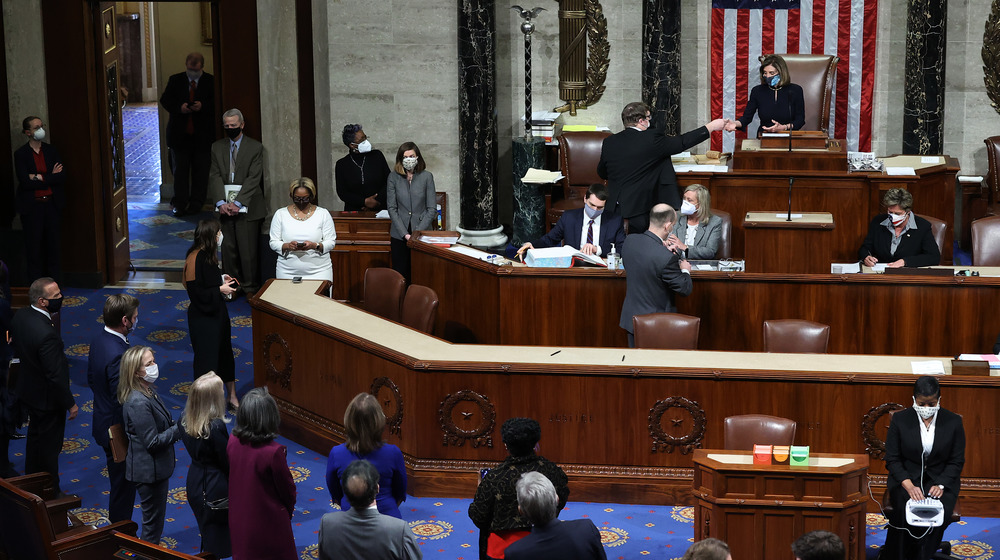Here's How Americans Really Feel About Trump's Second Impeachment
In January 2021, Donald Trump became the first president to be impeached twice. The House of Representatives impeached Trump on Jan. 13 on one article of "incitement of insurrection" for the role his inflammatory rhetoric and tweets played in the deadly Jan. 6 attack on the U.S. Capitol. The article read: "In his conduct while President of the United States ... Donald John Trump engaged in high Crimes and Misdemeanors by inciting violence against the Government of the United States" (via NPR). The resolution states Trump's actions violated his constitutional oath as president.
Trump's trial in the U.S. Senate is set to begin the week of Feb. 8. But how do Americans feel about the possibility of convicting Trump? A survey from The Associated Press-NORC Center for Public Affairs Research found that "a majority of Americans" believe that Trump is at least somewhat responsible for the January insurrection (via AOL), with two-thirds of respondents saying the former president has "at least a moderate amount of responsibility" for the attack.
The survey also found that, although most Republicans responded that Trump has no blame for the attack, three in ten do believe he's at least somewhat culpable. The survey also found that among those interviewed, many who were against conviction but open to some sort of accountability for Trump, felt that impeachment was not the way to go. Further, respondents against conviction believed the trial was unnecessary since Trump was no longer president, an argument that Trump's lawyers are making as well — that is he "now a private citizen" (via PBS).
Americans may agree that Trump bears responsibility, but they're divided on conviction
The AP-NORC survey found that 47 percent of Americans think the Senate should convict Trump. Forty percent think he shouldn't be convicted, and 12 percent are undecided. A poll conducted by Monmouth University in late January skewed a little differently. As reported by Politico, 56 percent of Americans support the House's decision to impeach Trump and believe he should be convicted by the Senate and prohibited from ever holding a role in federal office again. The outlet noted that when Monmouth conducted the same poll for Trump's first impeachment in 2019, 53 percent of respondents agreed with the vote.
The polls conducted by both AP-NORC and Monmouth University found that, unsurprisingly, responses were sharply divided down partisan lines for Democrats and Republicans. The Monmouth poll found that 92 percent of Democrats support impeachment and conviction compared to just 13 percent of Republicans. Independents are narrowly in favor at 52 percent.
AP-NORC's survey also found that a disturbingly high number of Americans believe the election was illegitimate and stolen from Trump with 65 percent of Republicans agreeing with this baseless claim, which spurred insurrectionists to storm the Capitol during the Electoral College vote count to certify Biden's win and subsequently led to Trump's second impeachment. In reality, the 2020 election was the most secure in American history, a fact that has been confirmed by the Department of Homeland Security and U.S. election officials (via Vox).
Lawmakers will look to hold Trump accountable should he prevail in second impeachment trial
In another poll, conducted by Marist at the end of January, 41 percent of respondents believed Donald Trump should be acquitted of his impeachment charge, while 50 percent were in favor of conviction and 9 percent were unsure. The numbers were closer to those of the AP-NORC survey versus Monmouth, but similar to both, the responses reflected a partisan nation, with Republican and Democratic responses exact mirrors of one another.
Lawmakers are also divided, of course, though as with the American people, a majority believe the president bears responsibility for his role in the Jan. 6 breach of the Capitol. Senate Minority Leader Mitch McConnell said of the attack, "The mob was fed lies... They were provoked by the president and other powerful people" (via The New York Times).
This said, as The Associated Press notes, the Democrats do not look to have the votes to convict. In fact, 13 days after the House impeached Trump, GOP Sen. Rand Paul of Kentucky forced a procedural vote on a motion that stated the impeachment trial was unconstitutional because Trump was no longer a sitting president (via The Hill). The vote failed 55-45; however, it underscored how difficult it will be for the Senate to convict Trump on the sole charge as it will need a two-thirds majority from a 50-50 chamber. Alternatives to impeachment would include censure and the 14th Amendment, which would bar Trump from holding future office (via Axios). Censure would require 60 votes in the Senate to pass.


